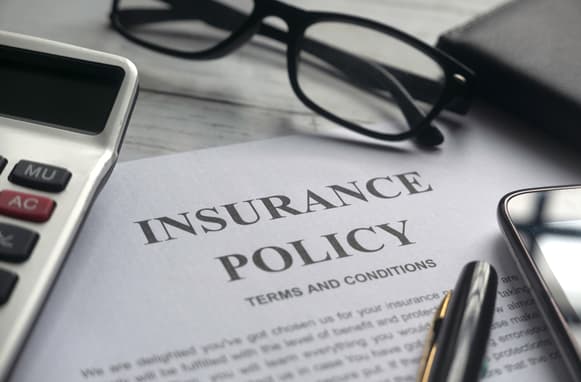Jump to a section
Running a small business comes with many risks and liabilities that make having the right insurance coverage essential. From property damage to lawsuits, business owners need policies in place to protect their company’s assets and finances should something go wrong. But with so many options available, it can be confusing to figure out exactly what insurance a small business needs.
In this comprehensive guide, we’ll cover the key types of business insurance policies, what coverage is essential or optional, how to evaluate your specific risks and liabilities to determine what you need to protect your company, and where to find the right insurance provider for your small business.
Key takeaways
- Business insurance provides indispensable financial protection against potentially devastating liabilities, losses and lawsuits that can put small companies out of business.
- Core policies you must consider include general liability, commercial property, business interruption, and professional liability insurance to start.
- The ideal coverage for your small business depends entirely on your specific industry, size, number of employees, assets, and risk exposures - analyse your individual situation closely.
- Though representing an added expense, adequate insurance coverage gives invaluable peace of mind and security to owners knowing their livelihood remains protected even in worst case catastrophic scenarios.
What is business insurance and why is it important?
Business insurance refers to various policies that provide financial protection for small companies against losses due to events like property damage, legal disputes, injuries, or disruptions to operations. Without adequate coverage, these issues can devastate a small business financially. The right insurance helps safeguard your company’s assets and mitigate risks that could otherwise put you out of business. It’s a necessary cost of doing business.
Different types of business insurance coverage:
There are many forms of insurance policies small business owners need to consider. The most common include:
General liability insurance
This coverage protects your business from financial loss due to bodily injury, property damage, personal injury and advertising injury caused to a third-party for which your business is liable. For example, if a customer gets injured on your property and sues.
Property insurance
This policy helps cover repair or replacement costs if your commercial property and possessions are stolen, damaged or destroyed by causes like fire, smoke, wind and hail storms. Depending on your business, this may include building coverage, business personal property, or business income insurance to pay operating expenses if your company temporarily closes due to property loss or damage.
Business interruption insurance
This type of coverage helps replace lost income if your small business has to suspend operations due to disaster-related property damage. It can help pay ongoing expenses like payroll, taxes, rent and loan payments during shutdowns after catastrophic events.
Professional liability insurance
Also called errors & omissions insurance, this policy provides protection if your business gets sued for negligence, errors, or failing to deliver contracted professional services. It covers legal expenses and any settlement or damage costs. This is crucial for consultants, service providers and licensed professionals.
Factors to consider when choosing business insurance:
When assessing your business insurance options, there are a few key factors to take into account:
Industry-specific risks
The types and level of coverage your company needs can vary widely depending on your field. High-risk industries like construction may focus more on liability policies, while retail stores concentrate on property coverage against theft and damage. Consider vulnerabilities specific to your sector.
Coverage limits
Policies have caps on the amount the insurer pays per claim. Evaluate potential costs of property damage, legal fees, or other issues to ensure your limits are sufficient. Too low and you risk major out-of-pocket expenses.
Deductibles
This is the portion of the claim you pay before coverage kicks in. Opting for a higher deductible lowers your premiums but increases the initial amount you would have to pay out of pocket. Choose deductibles your business can afford per incident.
Business size and assets
The number of employees, scope of operations, business assets and overall size of your company also determine how much coverage you should have. More employees equals greater liability risk exposure. More property and assets mean higher replacement costs to cover.
Budget
Insurance represents a significant business expense. Shop around to find the right policies for your budget while still getting adequate protection. Divide coverage into “must-have” essentials and “nice-to-have” options.
Essential business insurance policies for small businesses
While there are many available coverage options, these three core insurance policies are considered absolutely vital for nearly all small business:
Public liability insurance
This is a type of general liability insurance that specifically covers claims of injury, death or property damage to third-parties caused by your business operations and property—one of the highest risk areas.
For example, if you own a restaurant, a customer could come in, slip on a wet floor, and hurt themselves. You may then be liable for their medical expenses, lost wages, pain and suffering damages, etc. This insurance protects you from costly lawsuits or settlements if found legally liable, including legal defense costs.
Employers’ liability insurance
If your small business has any employees, this coverage is legally required in the UK. It offers protection if staff get sick or injured at work and your company is determined responsible. For example, if an employee injures their back lifting heavy boxes and sues for compensation.
Product liability insurance
For any small business that manufactures or sells products, this is crucial protection from financial loss due to legal responsibility arising from a defective product that causes injury or bodily harm to customers. For example, if you produce toys and a child chokes on a small part broken off one of your products. It offsets costs of defence lawyer fees, settlements, and judgments related to product safety claims.
Additional insurance options for your small business
Beyond those basic three policies directly tied to liability and risk problems that can bankrupt small firms, other supplementary business insurances are definitely worth considering:
Professional indemnity insurance
For consultants, service providers and freelancers, this coverage protects against claims of professional advice or service errors that fail to meet generally accepted industry standards. It covers inherent risks when relying on the expertise and skills of you or your staff. For example, if you are an accountant and make a mistake on a client's taxes leading to an audit, you would be covered for legal fees and any payouts awarded.
Cyber liability insurance
In today’s digital age, all companies face some risk of cyber threats like data breaches, hacks or cyber theft leading to potential lawsuits or costs for investigations, audits and victim compensation. For instance, if hackers access your customer records and you have to pay for credit monitoring services for those affected. This policy helps limit financial fallout from such IT security incidents.
Business interruption insurance
Similar to property coverage, this insurance covers income lost due to disruptions to your operations from covered events, ensuring payroll, bills and other expenses get paid if your company temporarily closes due to disaster or crisis until business resumes. For example, if a fire destroyed your office and you couldn't operate for months during repairs and rebuilding. This guards against crippled cash flow threatening the business itself if circumstances outside your control halt things.
Determining coverage needs
Figuring out precisely what business insurance to buy involves:
Assessing the specific risks and liabilities of your business
Conduct an audit identifying all exposures based on your commercial property, assets, equipment, inventory, staff, services/products and operations. Review past issues and legal scenarios. This reveals what vulnerabilities your policies must address.
Calculating the appropriate amount of insurance coverage
For each identified risk category, determine realistic worst-case-scenario losses you could incur in areas like property damage, lost income, liability judgments, theft, accidents, etc. This is the minimum level the policy caps should cover per incident to offset financially devastating effects.
Factors that may influence your business insurance needs
Your specific business model and operations impact your risks and insurance needs. For example:
- A shop with customers on-site has more risk of slip-and-fall injuries than an online business.
- A manufacturer is legally responsible for any defective products which could cause harm.
- Hiring independent contractors changes legal liability compared to only using employees.
Look closely at how your company is structured and operates day-to-day to evaluate areas of risk exposure unique to your business. This helps determine what coverage best fits your situation.
Choosing the right business insurance provider
Not all carriers are equal. Finding one that offers optimal plans and financial stability for your situation involves:
Researching reputable insurance companies
Ask colleagues in your field for referrals. Search industry associations and small business resources for trusted, highly rated provider recommendations appropriate for your niche. Develop a shortlist of top contenders for quotes.
Comparing insurance policies and prices
Get specific quotes showing exactly which risks are covered under what limits and deductibles for your individual business. Compare side-by-side based on both premium costs as well as sufficient provisions suited to your previously assessed needs.
Also look at payment methods and options offered - some insurers may allow annual payment for a small discount, while others permit monthly instalments that can make budgeting easier, especially when getting started.
Consider paying with a business credit card if available to benefit from cardholder protections, accumulate rewards points, and easily track insurance expenses. Review all policy fine print thoroughly and ask questions to determine the best-value coverage for your small business from a reputable provider.
Considering customer reviews and ratings
What do actual customers report about their claims experiences with the insurer? Check for red flags like frequently denied claims that should have reasonably been approved. Good customer service handling issues smoothly counts too.
The bottom line
When it comes down to it, business insurance serves as an essential financial safety net that can save your company from ruin if something goes wrong. Without adequate safeguards in place, seemingly minor issues like a single lawsuit or accident can spiral into complete disaster for an unprotected small business.
While paying for insurance does add ongoing overhead costs, viewed as an investment in your company's future, it returns protection and peace of mind that your livelihood won't get wiped out in an instant.
By taking the time to accurately assess your specific exposures, consulting insurance professionals, comparing plans and costs, and educating yourself on the fine print details, your small business can secure insurance that strikes the optimal balance between prudent protection and affordability. The investment offers peace of mind money can’t buy.
Frequently Asked Questions
Here are answers to some other common small business insurance questions:
Is business insurance mandatory?
There is no general legal mandate, but employers' liability insurance is required by law if you have employees. Motor insurance is compulsory if company vehicles are used. Specific sectors or government contracting work may also stipulate necessary coverage. Beyond legal compliance though, properly protecting your company against risks through insurance is effectively mandatory for prudent financial management. No smart UK small business can afford to be caught off guard by a major lawsuit, property loss or other damaging mishap that could overwhelm unprepared finances.
How much does business insurance typically cost?
The price you pay for business insurance depends on several factors, including:
- Industry - An IT consulting firm will generally pay less than a construction company, since tech services are lower-risk.
- Business size - A small shop with 2 employees will likely pay less than a 15-person law firm with higher liability exposure.
- Coverage level - Basic policies just meeting minimum requirements are cheaper than more comprehensive plans.
For instance, a footcare clinic may be able to get essential public and professional liability cover for under £850 annually, while a furniture store may pay over £1,500 per year for broader property, commercial vehicle, inventory and liability protections based on the value of insured assets.
When comparing quotes, balance your specific business requirements and risk levels against your budget to find an optimal and sensibly priced policy - don’t pay for more than you need or scrimp on inadequately low cover. Customise tiered options for affordable but sufficient protection.
What are the common exclusions in business insurance policies?
Even the best policy has limits, gaps and exclusions where the insurer will not pay. Standard exclusions often involve claims due to illegal activity, intentional damage, war, nuclear incidents and pre-existing issues known before obtaining coverage. Other clauses may exclude payment above certain limits or if conditions like security standards are not met. Read all exclusions closely so you know what risks remain your responsibility.
This does not constitute financial advice.











